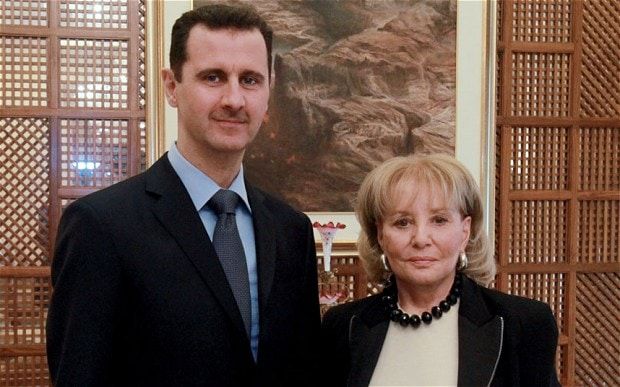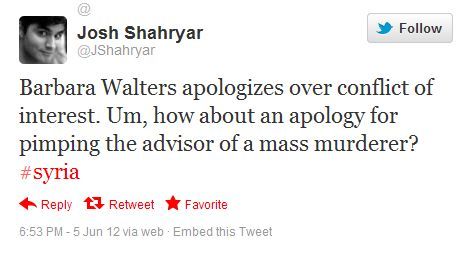 Barbara Walters fessed up to the Daily Telegraph that her December interview with Bashar Assad involved an ugly conflict of interest.
Barbara Walters fessed up to the Daily Telegraph that her December interview with Bashar Assad involved an ugly conflict of interest.
After Sheherazad Jaafari, Assad’s press advisor, helped Walters get the coveted interview, the ABC News vet threw her weight behind Jaafari’s efforts to get an internship at CNN and a place at Columbia University.
When confronted with the emails, which were obtained by a Syrian opposition group, the 82-year-old ABC broadcaster admitted a conflict of interest and expressed “regret” for her actions.
Bill Carter says Walters’ protekzia was to no avail — Jaafari didn’t make it into Columbia; CNN didn’t even interview her.
Jaafari didn’t just facilitate Walters’ interview with Assad. Emails leaked by the hacker group known as Anonymous show that Jaafari also coached Assad on how to parry Walters’ expected questions. So Walters is taking a beating on forums like Twitter:
Before joining the inner circle of Assad’s spin doctors, Jaafari worked for Brown Lloyd James. Shortly before her arrival at BLJ, the PR firm had facilitated Vogue’s odious profile of the the Syrian dictator’s family life. Assad’s hired media guns are indeed birds of a feather.
It’s not necessarily wrong for contacts in any industry to exchange favors. But Walters acknowledges that she crossed a line. The only winner from these professional courtesies was, uh, Bashar Assad. Carter writes:
One longtime television news executive, who insisted on not being identified commenting on a rival news organization’s employee, said the circumstance was far from unusual in a business where favors are often requested on behalf of contacts.
“It’s a little ugly to see how the sausage is made to land these big interviews,” the executive said, adding that the favors appeared to be the result of an association established by the interview, not a quid pro quo for it.
Dealing with tyrants, news services inevitably have to question the price of access. CNN’s mea culpa for its relationship with Saddam Hussein is worth revisiting.
Related reading: The Mideast PR Machine: From Assad to the Palestinians


